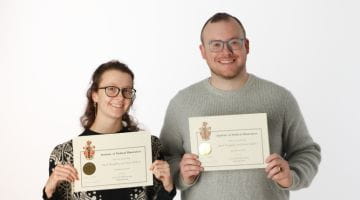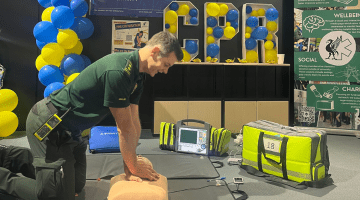About this course
Our new MA Nursing Mental Health postgraduate degree will help you to develop your theoretical knowledge of nursing and positively influence patient care.
- Enjoy high quality teaching in a modern and developing faculty
- Develop your thinking and knowledge with a combination of core, optional and research modules
- Enhance patient care through your nursing education and research
- Study full-time or part-time
As a modern, civic university, LJMU is integral to the life of the city, but we are also global in our approach, forging international partnerships to facilitate world-leading research and collaboration to tackle some of the huge global issues facing the modern world that have an everyday impact here at home.
As a student on this programme you will learn from a programme team with a depth and breadth of clinical and academic knowledge designed to ensure you are supported in developing both personally and professionally.
The programme and MA Nursing are our two MA Nursing postgraduate pathways. We also offer an MA Mental Health programme for students who are not necessarily working in a clinical setting.
Course modules
Discover the building blocks of your programme
There are five compulsory Core modules, totalling 130 credits.
The remaining credits are made up of your choice of Option modules, meaning you can tailor your degree to your personal interest (to a total of 180 credits for the MA award).
International applicants: Please note that as an international student you would not eligible to select modules which have assessments based in practice and instead will complete theoretical modules.
Further guidance on modules
Modules are designated core or optional in accordance with professional body requirements, as applicable, and LJMU’s Academic Framework Regulations. Whilst you are required to study core modules, optional modules provide you with an element of choice. Their availability may vary and will be subject to meeting minimum student numbers.
Where changes to modules are necessary these will be communicated as appropriate.
Core modules
Introduction to Practice 1
20 credits
20 credits
In this module, we will introduce you to a range of values, attitudes and skills that underpin safe and effective clinical practice. You will also explore an overview of the human body systems that inform skills for nursing practice and develop an overview of psychosocial concepts in relation to well-being, disease and illness.
Once you have completed the module, you will be able to participate in guided care to achieve the proficiencies with associated NMC Professional Values (progression point 1) and demonstrate knowledge and skills relevant to medicines management.
Promoting heath and preventing Ill health through evidence based practice
20 credits
20 credits
This module introduces you to the concept of nursing as an evidence based profession through the lens of public health.
After completing the module you will be able to:
- Analyse the characteristics of effective evidence associated with core concepts and practices in nursing
- Critique the role of evidence in shaping the development of nursing skills in public health
- Critique the different social determinants of health and how they impact population health
- Demonstrate an understanding of public health on a local, national and global perspective
Developing Practice for Mental Health Nursing 1
20 credits
20 credits
Building on your earlier learning, this module will support you to confidently engage with a range of values, attitudes and skills that underpin safe and effective clinical practice. After completing the module, you will be able to actively participate in care with minimal guidance to achieve proficiencies with associated NMC Professional Values, and conduct nursing care to the required NMC standards for progression point 2.
Evidence and Evaluation in the Development of Nursing Practice
20 credits
20 credits
During this module you will establish your evidence-based thinking in the context of decision making for effective nursing. It will help you to build a critical knowledge base of the philosophical foundations of health and social research and gain a sound foundation in research design and methodology.
It will prepare you to conduct empirical and literature based research, so you can carry out audit or service evaluation.
After completing the module, you will be able to:
- Apply methods of inquiry to nursing related issues
- Review processes for the safe and ethical construction and use of evidence in nursing
- Critically analyse how evidenced based practice is informed by the research process within your own specialist field
- Critically analyse the appropriateness of research methods relevant to own professional area
- Critically analyse purpose and context of research and the basis for selecting appropriate research methodology and designs
- Critically analyse the philosophical location of research approaches
Dissertation
30 credits
30 credits
You will undertake either an empirical research study or desk-based systematic review (6,000 words).
You will negotiate and agree the topic with your supervisor. 15 hours tutorial support will be delivered via both group and one to one supervision.
Co-ordinating Safe, Quality Mental Health Care
10 credits
10 credits
This module will prepare you to:
- critically review quality assurance processes for well-coordinated care
- critically appraise advanced medication management in adult nursing
- competently undertake a health numeracy assessment
Leadership, Management and Supervision
20 credits
20 credits
This module will help to prepare you for the management of the care of adult patients with complex needs. It is assessed by a presentation and a reflection piece (2,000 words).
Emerging practice in Mental Health Nursing
40 credits
40 credits
The aim of this module is to build on the earlier module 'Developing Practice in Mental Health Nursing' and consolidate your engagement engagement with knowledge, attitudes, values and skills associated with safe and effective care to support your development as an independent practitioner.
By the end of the module, you will be able to practice independently with minimal supervision to achieve the proficiencies associated with NMC Professional Values (progression point 3).
Your Learning Experience
An insight into teaching on your course
Study hours
This part-time course has a strong emphasis on self-guided study. A 20-credit module, for example, may involve 30 hours of timetabled study over a 15-week period, supported up by significant independent study focused on virtual learning resources and allocated tasks.
Teaching methods
To maintain our professional relevance and enable you to forge key contacts for the future, we work with local stakeholders. Some of our health contacts include Mersey Care NHS Foundation Trust, St Helens and Knowsley Hospitals NHS Trust, Royal Liverpool and Broadgreen University Hospitals NHS Trust.
Applied learning
MA Nursing offers a blended learning approach with staff always looking for new and engaging ways to develop your knowledge and skills in your chosen pathway.
You will learn via key note lectures, case scenarios, workshops, discussions and clinical development days.
LJMU's virtual learning environment further enhances the learning experience and the use of wikis and group blog videos have received very positive feedback from students across the school. All course lectures and materials are available online
How learning is monitored on your programme
To cater for the wide-ranging content of our courses and the varied learning preferences of our students, we offer a range of assessment methods on each programme.
Where you will study
What you can expect from your School
Situated in the City Campus, the School of Nursing and Allied Health works with a wide range of health and social care organisations to design, deliver and evaluate a dynamic suite of postgraduate programmes. In addition to specialist facilities, you will find high quality meeting and seminar rooms and lecture theatres, the Avril Robarts Library which is open 24/7 during semesters plus a large cafe, IT facilities and social spaces.
LJMU's excellent educational and professional training facilities include 1.6 million practice suites which show a patient's journey from the home environment through to rehabilitation. We use the latest clinical equipment for simulations and developing clinical skills in child, adult and mental health nursing, paramedic practice, social work and midwifery. We also have purpose-built, soundproof booths with video camera and playback facilities.
Course tutors

Dr Amanda Garrow
- Programme Leader
I love to see students develop and evolve as they progress through a module or programme. To watch the pieces of the jigsaw come together for them is why I love my job. To be a small part of people's development and journey is such an honour.
I love to see students develop and evolve as they progress through a module or programme. To watch the pieces of the jigsaw come together for them is why I love my job. To be a small part of people's development and journey is such an honour.
Daniel is the programme leader for MA Nursing and MA Nursing Mental Health at LJMU. He qualified with a HE Diploma in Nursing in 2009, working as a staff nurse for six years in various roles including in SAU, Vascular, GI, Orthopaedics, and in Critical Care. In 2013, he completed a BSc in Professional Practice, working as a practice education facilitator and then as an advanced clinical practitioner before gaining a MSc in Advance Practice in 2017. He moved into academia in 2020, working as a Senior Lecturer in Pre-Registration Nursing and then as a Senior Lecturer in Advanced Practice. His research interests include Advanced Practice, Non-Medical Prescribing, Palliative Care, and Critical Care. His aim is to develop the profile of Advanced Practice within his research and to combine Advanced Practice with the interests previously listed. Daniels varied work and educational background has allowed him to develop a well-rounded understanding of many specialties and to refine his skills as a communicator and team player. He is currently completing a Postgraduate Certificate in Education and has plans to eventually undertake a Professional Doctorate.
Career paths
Further your career prospects
LJMU has an excellent employability record with 96% (HESA 2018) of our postgraduates in work or further study six months after graduation. Our applied learning techniques and strong industry connections ensure our students are fully prepared for the workplace on graduation and understand how to apply their knowledge in a real world context.
As a Registered Nurse working within your chosen field of expertise you may already be in full-time employment.
Postgraduate study is used by some students to support career progression and promotion. For others, it provides an opportunity to explore a different field and change professional direction. Central for all though, is the desire to update their skills and enhance their knowledge.
As a degree profession nursing sees the added value that research, learning and academic study can have on the patient journey, quality of care and of course a nurses personal and professional development. Key to this is lifelong learning strongly supported by the regulatory body the Nursing and Midwifery Council through revalidation.
This programme offers progressive, practice-focused learning and development within a constantly evolving clinical world.
Fees and funding
Tuition Fees:
- Home fee:
- £10,050
Fees
The fees quoted at the top of this page cover registration, tuition, supervision, assessment and examinations as well as:
- library membership with access to printed, multimedia and digital resources
- access to programme-appropriate software
- library and student IT support
- free on-campus wifi via eduroam
Additional costs
Although not all of the following are compulsory/relevant, you should keep in mind the costs of:
- accommodation and living expenditure
- books (should you wish to have your own copies)
- printing, photocopying and stationery
- PC/laptop (should you prefer to purchase your own for independent study and online learning activities)
- mobile phone/tablet (to access online services)
- field trips (travel and activity costs)
- placements (travel expenses and living costs)
- student visas (international students only)
- study abroad opportunities (travel costs, accommodation, visas and immunisations)
- academic conferences (travel costs)
- professional-body membership
- graduation (gown hire etc)
Funding
There are many ways to fund postgraduate study for home and international students. From loans to International Scholarships and subject-specific funding, you’ll find all of the information you need on our specialist postgraduate funding pages.
Please be aware that the UK’s departure from the EU may affect your tuition fees. Learn more about your fee status and which tuition fees are relevant to you.
Funding Part-time Study
Unfortunately, due to its three year duration, the part-time version of the programme is not eligible for Student Loans Company funding support.
Entry requirements
You will need:
Qualification requirements
A levels
The MSc Mental Health Nursing programme recognises that prior learning and experience is integral to the student’s learning. Applicants must be able to demonstrate a minimum of 770 hours healthcare experience (approximately six months full-time work). All applicants are required to make a RPL claim to demonstrate how their previous care experience and graduate studies have equipped them to undertake an accelerated nursing programme RPL to the MSc nursing programme will be a minimum 770 hours practice and 770 hours theory= 1540 hours. A first honours degree (normally 2:2 or above) in any subject English Language and Maths GCSE at grade A* - C Numerical grading is 4-9 (discuss with admissions team if you have equivalent qualifications) Any overseas qualifications should be equivalent to UK qualifications which meet our entry requirements. If you have completed your degree outside the UK, we will require a clear copy of your degree documentation to ensure NARIC comparability. Please note that all applicants who are invited to interview will be required to present their original degree documentation. Applicants must be able to demonstrate a minimum of 770 hours healthcare experience (approximately six months full-time work). All applicants must be of good health and good character. All applicants selected at interview will have a Disclosure and Barring (DBS) check as well as Occupational Health Clearance.
Alternative qualifications considered
Recognition of Prior Learning If applicants can demonstrate that they have already achieved learning equivalent to a module or modules, or a level of study, in the programme you are considering applying for at LJMU they may be eligible to be awarded credit for this learning or to have credit transferred from another UK institution. This would mean that those modules would not have to be studied at LJMU. Credits may be awarded for learning already undertaken in the University or elsewhere for which you have received qualifications or certificates. This is called credit transfer or the Recognition of Prior Learning (RPL). You may also submit a claim for recognition of unaccredited prior learning (RP(E)L). This may be for work you have accomplished in a professional, paid or voluntary capacity. This has to be submitted via an RPL form with supporting evidence. For more details on how to apply for Recognition of Prior Learning, please contact the faculty admissions team. Applicants, including Registered Nurses, can apply for RPL up to a maximum of 50% of the credits of the programme. All theory and practice elements must be met for the credit claimed. Each claim will be examined on an individual basis in line with University Regulations and NMC Requirements.
International requirements
Other international requirements
Where English is not an applicants first language and at least GCSE Level English (with a Grade of C or above) has not been achieved in the UK, International English Language Testing System (IELTS) is required. The programme will apply the NMC requirements for overseas applicants to the register i.e. where the scores are at least 7.0 in the listening and reading sections and at least 7.0 in the writing and speaking sections and where the overall average score is 7.0.
How to apply
Securing your place at LJMU
To apply for this programme, you are required to complete an LJMU online application form. You will need to provide details of previous qualifications and a personal statement outlining why you wish to study this programme.
You can apply now for the MA Nursing course via the LJMU online application form.
You should complete the form thoroughly and provide a detailed personal statement which reflects your suitability and aptitude for the programme.
Your university life
From accommodation and academic support to clubs and societies. Find out what LJMU has to offer.
Talk to our students
Connect with a current LJMU student for advice and guidance on university life, courses and more.
See what our students are saying
At LJMU we want you to know you’re making the right choice by studying with us. You can see what our students are saying about their experience with us through their reviews on the following websites:
Related Links
News and views
Browse through the latest news and stories from the university

.png)








The University reserves the right to withdraw or make alterations to a course and facilities if necessary; this may be because such changes are deemed to be beneficial to students, are minor in nature and unlikely to impact negatively upon students or become necessary due to circumstances beyond the control of the University. Where this does happen, the University operates a policy of consultation, advice and support to all enrolled students affected by the proposed change to their course or module.










